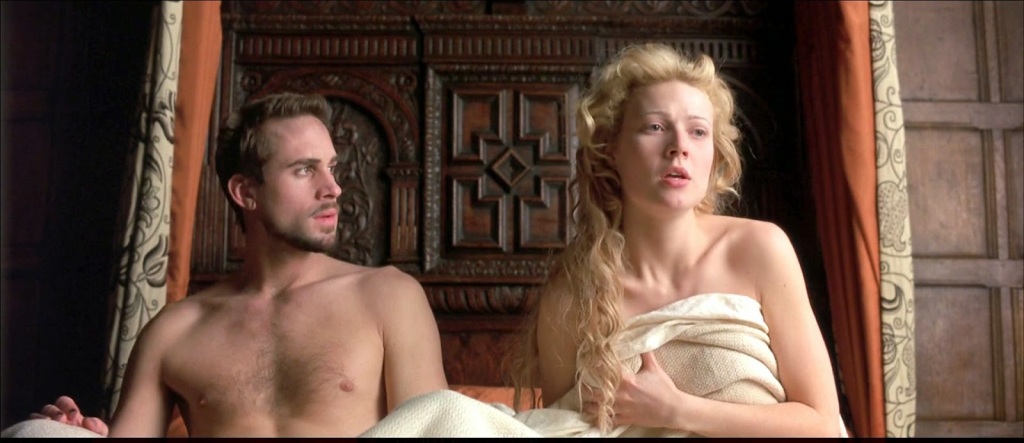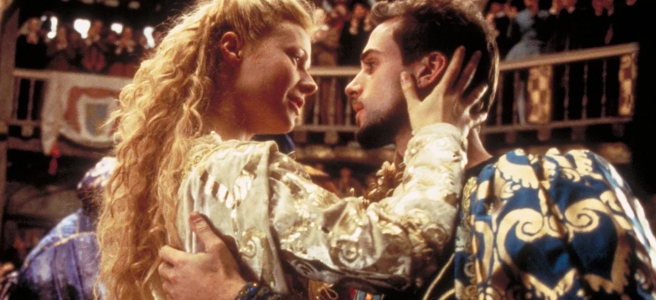With 1,500 writing credits on IMDb, William Shakespeare has to be the most prolific dead writer of all time. And with good reason. The consensus is that the Bard wrote at least 37 plays (there may be two lost plays), and his classic works are still being staged and made into Shakespeare movies over four hundred years after his death.
But how does his work translate to film, a medium that would not exist until some three hundred years after he died?
To illustrate how contentious the answer might be, here are two quotes from prominent stage and screen directors as recounted by Douglas Brode in his book Shakespeare in the Movies: From the Silent Era to Shakespeare in Love:
Shakespeare would have made a great movie writer.
Orson Welles
Shakespeare is no screen writer.
Peter Hall
Brode goes on to state:
William Shakespeare’s plays were written to be seen, not read—at least not by anyone other than the company performing them. They were never printed in his lifetime, probably according to his wishes. The plays were meant to be enjoyed in the immediate sense, not as removed literary works to be studied, like butterflies mounted by some eager collector who presses out all the lifeblood and mummifies beauty under glass.
In Shakespeare’s day, Brode writes, audiences were made up of “respectable, middle-class types one evening and a grotesque mix of university intellects and uneducated street people the next,” which Brode compares to “audiences at mall multiplexes.” He adds:
Shakespeare’s plays, filled with murders, sexual transgressions, ghosts, and witches, have more in common with the latest blockbusters than anything on the art-house circuit.
In my opinion, there’s nothing wrong with adapting Shakespeare for modern audiences. In fact, by updating the situations and at times even the language, filmmakers may be giving us an experience closer to that of an audience in Shakespeare’s time. His plays were lively, contemporary, and comprehensible to an Elizabethan crowd, not boring, historical, and unintelligible, which is sometimes (erroneously) their reputation today.
There are many faithful, traditional Shakespeare movies.
Here are 7 of the most unconventional.
SHAKESPEARE IN LOVE (1998)
Surprisingly little is known about the details of William Shakespeare’s life, a fact that author Bill Bryson repeats many times in his insightful book Shakespeare: The World as Stage. That lack of information enabled writer Tom Stoppard (who wrote and directed the unconventional Hamlet adaptation Rosencrantz and Guildenstern Are Dead) to stop worrying about historical accuracy and instead focus on making a fun movie. In Stoppard’s words:
I have a take on historical accuracy, which is that all supposed historical truths are temporary, meaning they’re always there to be modified in the light of subsequent discoveries. But this film is entertainment, which doesn’t require it to be justified in the light of historical theory.
Is Shakespeare in Love historically accurate? Hardly. Does it matter? Not even a little. Because it’s an excellent film, deserving in every way of the seven Oscars it won, including Best Picture, Best Original Screenplay, and Best Supporting Actress for Judi Dench’s brilliant (but brief) portrayal of Queen Elizabeth I.

Set in 1593, Shakespeare in Love is an Elizabethan rom-com that is full of references to William Shakespeare’s work. Joseph Fiennes plays a young Shakespeare who is suffering from writer’s block. He is working on a new comedy called Romeo and Ethel, the Pirate’s Daughter, but he can’t seem to find inspiration until he meets the beautiful Viola (played by Gwyneth Paltrow). The rest of the plot is so much fun that I won’t spoil it for you here other than to say that it has all the elements you’ll find in the best Shakespeare plays.
My personal favorite scene is when the company finally puts on Romeo and Juliet, which of course Shakespeare has completed as the tragedy we all know and love today. The audience’s reaction is a reminder of how impactful the play’s ending would have been upon its release. Given our familiarity with the storyline, we can never have such an experience of shock and surprise. It’s one of many great moments in the film.
10 THINGS I HATE ABOUT YOU (1999)
The Taming of the Shrew is a particularly difficult play to update for modern audiences. It’s the misogynistic tale of Katherina, an intractable “shrew,” who is “tamed” by Petruchio until she’s an obedient bride. The play has seen several cinematic adaptations, the most notable being Sam Taylor’s (1929) and Franco Zeffirelli’s (1967), both of which starred celebrity couples (Mary Pickford and Douglas Fairbanks in 1929 and Elizabeth Taylor and Richard Burton in 1967). It was also adapted into a stage play and film called Kiss Me, Kate with songs by Cole Porter.

10 Things I Hate About You does an admirable job of at least updating the play for the ’90s (by modern standards, it’s still pretty far from being a feminist masterpiece). The plot is recast as a teen comedy, and with the exception of a few snippets (“I burn, I pine, I persish!”), Shakespeare’s dialogue is largely absent. But it’s a charming film with breakout performances from Julia Stiles, Joseph Gordon-Levitt and Heath Ledger. And it was even made into a short-lived TV show.
RAN (1985)
King Lear is a tragedy about a king named—well, Lear—who divides his kingdom between his three daughters, which turns out to be a big mistake. There have been just shy of a dozen film adaptations of King Lear, but none is as stunning as Akira Kurosawa’s samurai masterwork Ran, which was the most expensive movie production in Japanese history at the time. In Kurosawa’s vision, Lear is an elderly warlord named Ichimonji turning over his empire to three sons.

Ran (which means “chaos” or “turmoil” in Japanese) was not the legendary director’s first foray into adapting Shakespeare for the big screen. In 1957 Kurosawa directed Throne of Blood, which moves Shakespeare’s Macbeth from medieval Scotland to feudal Japan, and in 1960 he directed The Bad Sleep Well, which transposes Shakespeare’s Hamlet from Denmark to postwar Japan. Ran is not so much an adaptation as it is a brilliant reimagining of Shakespeare’s play. It’s truly an epic in its own right. Check out the Blu-ray if possible to fully appreciate this gorgeous film.
LOVE’S LABOUR’S LOST (2000)
Kenneth Branagh is the reigning king of the Shakespeare movie. He has directed and starred in five adaptations so far: Henry V (1989), Much Ado About Nothing (1993), Hamlet (1996), Love’s Labour’s Lost (2000) and As You Like It (2006). His version of Hamlet is notable because it was the first unabridged movie adaptation of the play, clocking in at just over four hours.

But Branagh’s version of Love’s Labour’s Lost is by far his most unconventional approach to Shakespeare’s source material: it’s a 1930s-era musical in which Shakespearean language gives way to song-and-dance numbers featuring classic tunes by Cole Porter, George Gershwin, Irving Berlin and more. It might sound like it shouldn’t work, but it does. It’s a great adaptation of what Roger Ebert calls “the weakest of Shakespeare’s plays,” and though Ebert compared the film to “cotton candy,” I think it’s a lot more substantial than that and a lot of fun as well!
MY OWN PRIVATE IDAHO (1991)
Shakespeare’s English histories are not his most popular plays as a general rule. According to a list compiled by shakespearances.com, Henry IV (Part 1), Henry IV (Part 2) and Henry V have not been staged in the last few years as frequently as Shakespeare’s most popular plays, and they haven’t been made into very many movies, either. The most famous version is probably Chimes at Midnight (1965) by Orson Welles, which is a mash-up of the previously mentioned Henry plays with elements of Richard II and The Merry Wives of Windsor. Laurence Olivier made a direct adaptation of Henry V in 1944, Kenneth Branagh made his own in 1989, and a new version called The King starring Timothée Chalamet is currently available on Netflix.

Inspired by Chimes at Midnight, director Gus Van Sant brought elements of Henry IV and Henry V into the bleak world of young street hustlers in Portland, Oregon (according to the end credits, the movie features “additional dialogue by William Shakespeare”). River Phoenix plays a lonely, narcoleptic male prostitute who embarks on an epic journey with a streetwalker played by Keanu Reeves, who is inspired by Shakespeare’s character Prince Hal. The movie, a landmark in New Queer Cinema, is raw and not always easy to watch. The cinematography is surreal, the kinky sex scenes rendered as artistic stills are brilliant, and when I heard the first strains of “The Old Main Drag” by the Pogues heralding the end credits, I gave the film a one-man standing ovation.
JUST ONE OF THE GUYS (1985)
Twelfth Night is one of Shakespeare’s best comedies, rivaled only (perhaps) by A Midsummer Night’s Dream and Much Ado About Nothing. But the play has only been directly adapted a handful of times, most notably the film Twelfth Night from 1996, which featured some great performances from Helena Bonham Carter, Ben Kingsley, Nigel Hawthorne and more.

The 1985 teen sex comedy Just One of the Guys is very loosely based on Twelfth Night. The film follows Terry Griffith, an aspiring high school journalist whose work is dismissed because she’s female. Naturally she decides to dress as a boy and enroll in the rival high school to prove that her work has merit. Along the way, many gender-bending misunderstandings occur, ultimately leading to Terry finding love and success as a budding journalist. Believe it or not, the movie led to two sequels: He’s My Girl (1987) and Just One of the Girls (1993) starring Corey Haim.
If you’re not into ’80s movies, check out She’s The Man (2006) for an even more modern twist on Twelfth Night. The film stars Amanda Bynes as the cross-dressing lead and Channing Tatum (in one of his first roles) as the object of her affections.
WEST SIDE STORY (1961)
Romeo and Juliet is one of Shakespeare’s most popular and widely read plays. As such, it has been adapted into film many times and has loosely inspired countless star-crossed lover stories. One of the best straight-ahead adaptations is Romeo and Juliet (1968) by Franco Zeffirelli. If you’re looking for a more modernized version, check out Baz Luhrmann’s Romeo + Juliet (1996). Luhrmann updates the setting and time period but keeps the Shakespearean dialogue.

West Side Story, which transports Shakespeare’s classic to 1950s-era New York and turns the story into a musical about warring street gangs, was a massive hit. The movie won ten Oscars, including Best Picture, and is now considered one of the greatest musicals ever made. With music by Leonard Bernstein and lyrics by Stephen Sondheim, the songs are iconic, from “Maria” to “America” to “I Feel Pretty.” Addressing issues of race, immigration and cross-cultural love, all set to a catchy beat, West Side Story is a delightful Shakespeare movie.
ALL THE WORLD’S A—SCREEN?
With hundreds of Shakespeare movies in existence and more in production every year, this list barely scratches the surface. For a more extensive exploration of Shakespeare movies, check out Douglas Brode’s book Shakespeare in the Movies: From the Silent Era to Shakespeare in Love, keeping in mind it was published in 2000 and is therefore missing twenty years of adaptations.
If you’ve never seen Shakespeare performed live, attend a performance as soon as possible! As much fun as a good Shakespeare movie is, there’s no substitute for a live theater performance.

